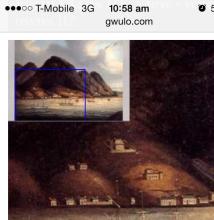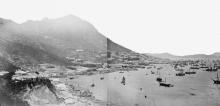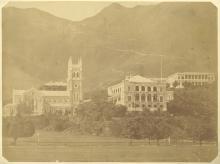Old maps and photos of Central from the 1800s show a commanding building overlooking the Botanical Gardens. It was named 'The Albany'.
The original building stood where a children's playground is today, bounded by Albany Road to the north, and Robinson Road to the south. (This section of Robinson Road was considered part of Garden Road when The Albany stood here)
Today there is a residential development named 'The Albany', but that is across on the north-west side of Albany Road, on the site of what used to be a government building. The building also gave its name to the 'Albany Nullah'. The nullah is no longer visible, but it used to run down the eastern side of the Murray Barracks, roughly the path of today's Cotton Tree Drive.
I haven't found anything more about it from the web. Does anyone know any more of its history, especially who lived there?



Comments
The Albany
From G. R. Sayer's books on the history of Hong Kong.
1) By NOV 1844, the civil officers' quarters at the Albany were already built and occupied.
2) Sayer quotes Rev. James Legge's account of early Victoria that was made nearly 30 years later and published in the China Review in 1872:
'Far up, if I recollect correctly, might be seen a range of barracks out of which have been fashioned the present Albany residences;'
3) An additional note in his book from 1862-1919 indicates that the Albany was a group of buildings above the Botanical Gardens originally built as government quarters and later used as barracks.
1870s The Albany
I assume the Albany is the long row of houses up the slope from Government House. St. John's Cathedral is in the centre of picture next to the Secretariat with Government House just above and behind it.
Re: The Albany
Thanks for the extra information. I think you're right about the photo, the long building near the top-left corner of the photo looks to be the Albany.
I've only found one other reference. A search for 'Albany' in the old newspapers up to 1900 returns a report of a robbery 'at the Albany, where the employees of the Hongkong and Shanghai Bank reside'. That is on page 2 of the Hong Kong Daily Press, 17 July 1868.
Re: The Albany
Extra notes from Annelise:
One of the first buildings in Hong Kong, and certainly one of the very first to be photographed. Early photo of The Albany.
The Albany
There is a clear picture of the Albany looking up from the Botanic Gardens on the HK library site dated 1865, I'll try and upload it later.
I belive (but could be proved wrong) that Robinson road was called Albany Road, and the Bowen Road Filter beds, below the LRC, were originally known as the Albany Filter Beds.
Public Records Office Photos
There are a whole set and you can link to the descriptions here
I had to go down to the PRO to actually see them, though.
Albany filter beds
Described 25th Nov 1901 as such here.
Google site:legco.gov.hk for "Albany filter beds" and it turns up about 10 results.
The Albany
here's the link
http://hkclweb.hkpl.gov.hk/hkclr2/object?svc=objrtv&src=CM&itemid=A7@W@…
The Albany - 1868
Here is thumbnail of the above image. Click here for full size image
History of The Albany - newspaper report
Hong Kong Telegraph
20 Jun 1935 - The Albany Sold
A history is included
[Admin: the newpspaper clipping is from 20 Jun 1934, not 1935]
The Albany c.1868
http://images.wellcome.ac.uk/indexplus/result.html?_IXMAXHITS_=1&_IXACT…
The Albany and (Old) Peak Road
http://images.wellcome.ac.uk/indexplus/result.html?_IXMAXHITS_=1&_IXACT…
The Albany
The original Albany was above the Botanical Gardens, on the eastern side of what is now Albany Road, as shown in the photos. The much later government quarters, called The Albany, was situated on the western side of Albany Road , across from the Cannosa Hospital.
The Albany
When the residences known as the Albany was erected in August 1844 it was known as the Civil Buildings to house government servants. The premises were later transferred to the military in May 1845 and finally became private residences.
John Graham Anderson
A John Graham Anderson, bill broker, resided at "The Albany" in 1869 (HK Jury List). On Sept 30 of that year, an auction of his furniture took place (from Carl Smith card).
GC
Demolition of The Albany
Found this information on Hong Kong Government Reports Online here
Demolition date
Hi Klaus,
Thanks for the extra information. I'd previously set the demolition date to 1934 too, but looking at the article Annelise posted above, the building was still standing in 1935. So I've set the demolition date to c.1935, but if anyone can be more accurate please let us know.
It was certainly gone by the time this photo was taken in the late 1940s:
Regards, David
Re: Newspaper Article and Demolition Date of The Albany
A typo in the date of the newspaper article of the sale of The Albany - 20 June 1934 According to the 1935 PWD Annual Report, the demolition was completed in April 1935.
Thanks, I've updated the
Thanks, I've updated the demolition date.
Regards, David
They were originally built for barracks and the two houses which now form the Canossa Hospital were officers quarters. Where Queen’s Gardens now stands, still known to the Chinese as Ma Cho Yuen (Horse Grass Garden), was a waste piece of land on which grass was grown for the army horses
Bought by Charles May in 1862, former superintendent of police and still owned by his descendents.
One of the occupants in 1853 was Dr. H. F. Hance, who has been mentioned in these notes (27-7- 33) as one of our old-time botanists.
The Albany was so named after the Duke of Albany.
Source: Old Hong Kong by Colonial Vol 1
The Albany
This was the residence of the ‘Superintendent of the Botanical Gardens’ - who was Charles ‘Chuck’ Ford in the 1870s to 1890s. My maternal grandfather, Douglas Vaughan Lewis Craddock, was born there on 26th November 1894. Charles Ford was my great-grandmother’s maternal uncle. She and her three sisters were sent to Hong Kong to find suitable husbands (the so-called ‘fishing fleet’). I believe Douglas William and Mary Edith Craddock set up home in the Mid-Levels around the time of a plague outbreak; perhaps Mary retreated to The Albany to give birth in greater security ... or simply to be with her uncle and aunt? Her second child was born in the UK in 1897 whilst she was visiting family. The Craddocks remained in Hong Kong until 1916. The Fords retired to England.
Mary’s sisters married (1) Alfred Woolley (who later moved to Kobe, Japan) - P&O, (2) George Cushing Cox - South China News, and (3) Thomas Wild Hornby - stockbroker. Douglas Craddock - CPR.